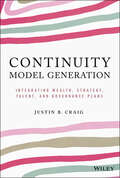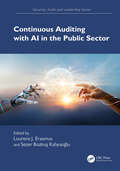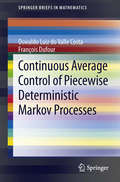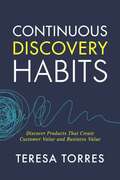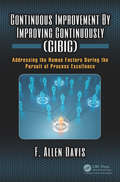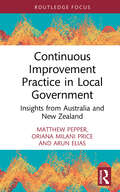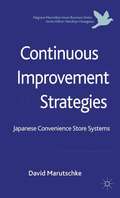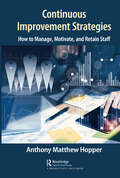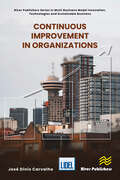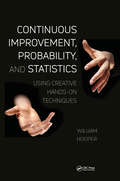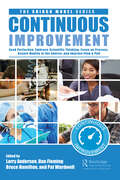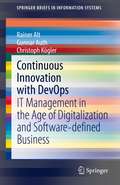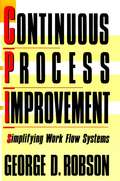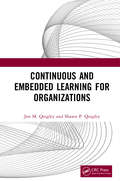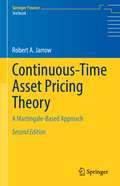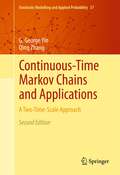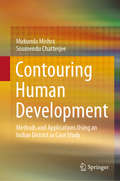- Table View
- List View
Continuity Model Generation: Integrating Wealth, Strategy, Talent, and Governance Plans
by Justin B. CraigOrganize and plan for your family business’s continued, intergenerational success Continuity Model Generation: Integrating Wealth, Strategy, Talent, and Governance Plans delivers a cohesive and comprehensive plan for family business leaders who seek to improve the chances of sustaining success across generations. Incorporating four distinct—but closely related—plans, Continuity Model Generation shows family businesses how to manage their strategy, their wealth, their talent, and their governance to achieve multi-generational success. The book also offers: A coherent framework (Continuity Canvas) for the integration of its multiple plans affecting every critical aspect of the family-owned or controlled business Straightforward and practical frameworks, meta-frameworks, and cornerstones to ground your family business’s strategy A variety of templates, checklists, and forms to organize your thinking and strategy Ideal for business-owning families, as well as their stakeholders and those who advise them, Continuity Model Generation: Integrating Wealth, Strategy, Talent, and Governance Plans is required reading for anyone interested in maintaining and developing family-based wealth.
Continuity and Change in Psychoanalysis: Letters from Milan
by Luciana Nissim MomiglianoThis book reflects certain continuity, dealing with the issue of how to be an analyst—through the different stages by which the author's psychoanalytic identity develops, from candidate to analyst and sometimes on to training analyst—in the continually changing world of our time.
Continuity and Change in the Welfare State: Social Security in the Republic of Ireland
by Anthony McCashinThis book offers an analysis of social security in Ireland from 1981 to 2016 - a period of immense economic and social change during which social provisions such as pensions and family benefits were downsized or diluted in many countries. It considers whether this important area of welfare state provision in Ireland changed, and the extent and pattern of change. In the first in-depth account of this aspect of social policy In Ireland, the book sets the welfare state in a historical and comparative context and reviews the impact of globalisation, politics and the financial crash on the scope and generosity of social security. The book will be of particular interest to scholars of welfare state politics and comparative social policy as well as to students of Irish social policy.
Continuous Auditing with AI in the Public Sector (ISSN)
by Sezer Bozkuş Kahyaoğlu Lourens J. ErasmusThe effectiveness of internal audit activities is important for the sustainability of change in the public sector. In this sense, the tools and techniques used and the level of competencies of public sector auditors are decisive. This book deals with the effects of current technological developments in the public sector on auditing and risk management activities. Therefore, it is a resource for public internal auditors to create a digital audit strategy based on artificial intelligence (AI) and blockchain-based applications. Institutionalisation of their structures is important for public sector internal auditors. For this, basic requirements, future expectations, and best practices are explained. The digital business model is presented to produce value-added audit findings and outputs that guide public internal auditors and all digital-era stakeholders. This book is a pioneering work based on continuous auditing/continuous monitoring approaches using various AI and blockchain-based tools and techniques.There is nothing more valuable to the success of a public internal auditor than a detailed understanding of the business. The important lesson in developing business knowledge, especially in the new audit universe emerging with digital transformation, is that all auditors must understand that they never finish learning about business processes, risks, and control points in the digital era.They must constantly push themselves to be motivated and learn about the business operations they audit to implement new audit approaches powered by AI. In addition to obtaining up-to-date business information from process owners and stakeholders, public auditors responsible for conducting an AI-based continuous audit programme should also look inside their departments for a different perspective on business information that impacts continuous audit programme phase details and has the potential to add value. It should be noted that the additional source of information begins with your individual audit experience, digital skills, and qualifications.
Continuous Average Control of Piecewise Deterministic Markov Processes (SpringerBriefs in Mathematics)
by Francois Dufour Oswaldo Luiz CostaThe intent of this book is to present recent results in the control theory for the long run average continuous control problem of piecewise deterministic Markov processes (PDMPs). The book focuses mainly on the long run average cost criteria and extends to the PDMPs some well-known techniques related to discrete-time and continuous-time Markov decision processes, including the so-called ``average inequality approach'', ``vanishing discount technique'' and ``policy iteration algorithm''. We believe that what is unique about our approach is that, by using the special features of the PDMPs, we trace a parallel with the general theory for discrete-time Markov Decision Processes rather than the continuous-time case. The two main reasons for doing that is to use the powerful tools developed in the discrete-time framework and to avoid working with the infinitesimal generator associated to a PDMP, which in most cases has its domain of definition difficult to be characterized. Although the book is mainly intended to be a theoretically oriented text, it also contains some motivational examples. The book is targeted primarily for advanced students and practitioners of control theory. The book will be a valuable source for experts in the field of Markov decision processes. Moreover, the book should be suitable for certain advanced courses or seminars. As background, one needs an acquaintance with the theory of Markov decision processes and some knowledge of stochastic processes and modern analysis.
Continuous Casting Investments at USX Corp.
by Clayton M. ChristensenFocuses on the difficulty established companies face when confronted with disruptive technological innovations. The power that their prior asset investments, their cost structures, and their customers have in constraining their investment and innovation decisions are clearly illustrated. Rewritten version of an earlier case.
Continuous Cover Forestry: Assessment, Analysis, Scenarios (Managing Forest Ecosystems #23)
by Klaus Von Gadow Timo PukkalaAlthough the majority of the world's forest ecosystems are dominated by uneven-sized multi-species stands, forest management practice and theory has focused on the development of plantation monocultures to maximize the supply of timber at low cost. Societal expectations are changing, however, and uneven-aged multi-species ecosystems, selectively managed as Continuous Cover Forestry (CCF), are often believed to be superior to monocultures in addressing a wide range of expectations. This book presents methods which are relevant to CCF management and planning: analysing forest structures, silvicultural and planning, economic evaluation, based on examples in Europe, Asia, Africa and North and South America.
Continuous Discovery Habits: Discover Products That Create Customer Value and Business Value
by Teresa TorresHow do you know that you are making a product or service that your customers want? How do you ensure that you are improving it over time? How do you guarantee that your team is creating value for your customers in a way that creates value for your business? In this book, you'll learn a structured and sustainable approach to continuous discovery that will help you answer each of these questions, giving you the confidence to act while also preparing you to be wrong. You'll learn to balance action with doubt so that you can get started without being blindsided by what you don't get right. If you want to discover products that customers love-that also deliver business results-this book is for you.
Continuous Improvement By Improving Continuously (CIBIC): Addressing the Human Factors During the Pursuit of Process Excellence
by F. Allen DavisAlthough many businesses, organizations, and institutions have currently implemented continuous improvement initiatives that address wants, needs, and challenges at the process and systems level, very few have effectively considered and addressed human factors. Thus, even businesses, organizations, and institutions with the most finely crafted continuous improvement systems face failure from inadequate human factors continuous improvement.Continuous Improvement by Improving Continuously (CIBIC): Addressing the Human Factors During the Pursuit of Process Excellence explains how the frustrating reoccurrence of operating failures are the result of flawed or fragmented business philosophies and principles. CIBIC is designed to promote the pursuit of excellence from mediocrity using an adaptable strategic model that promotes the pursuit of continuous improvement and sustainability in operations, performance management, and personal endeavors. By transforming the pursuit of excellence from a hit-and-miss endeavor to an easily achievable and sustainable continuous endeavor, CIBIC creates value where other systems fail. By addressing gaps, disconnects, and chaotic realities at a fundamental level through the sustained use of frameworks, methods, and analytics, CIBIC promotes the pursuit of excellence across the wide range continuum, eradicating the value and philosophical disconnects that generally plague individuals and collective interests. This book addresses this systemic problem by highlighting an incredibly comprehensive system that promotes continuous improvement and the pursuit of excellence. By highlighting key inner drivers, essential outer qualities, and supporting models and frameworks, the book makes the pursuit of excellence an easily sustainable and logical endeavor.
Continuous Improvement Practice in Local Government: Insights from Australia and New Zealand (Routledge Focus on Business and Management)
by Matthew Pepper Oriana Milani Price Arun EliasLocal government plays a critical role in the provision of governance, infrastructure, and services for local communities. Over the past 30 years this sector has undergone significant reforms because of various superordinate governments policy changes. Continuous improvement and quality programs have been a common tactical response undertaken by various local government organisations to remain sustainable and to continue to deliver value to their local communities. These tactical responses have had varying levels of success. This book seeks to go beyond a tactical focus and uncover the kinds of continuous improvement practices that are enacted in various local government contexts. A focus on practices enables practitioners and researchers alike to gain insights that to go beyond approaches which privilege the application of CI tools over the contextualisation of CI programs. Contextualisation affords the insightful deployment of programs that are specific to the needs and dynamics of local communities and operations. The cases presented share insights on aspects of CI including: embedding performance measurement; harnessing learning; contextualising CI activities to support the ongoing sustainability of these practices. Researchers and practitioners alike can draw benefit from the grounded industry base experiences and insights shared in the book.
Continuous Improvement Strategies
by David MarutschkeThis book discusses continuous improvement strategies of Japanese convenience store operators. The study highlights the efforts of companies operating under lean management systems to identify new, dynamic, firm-specific capabilities in highly competitive markets.
Continuous Improvement Strategies: How to Manage, Motivate, and Retain Staff
by Anthony Matthew HopperDuring this era of continuous improvement, healthcare organizations need to be staffed by engaged, motivated, and hard-working frontline employees. As these clinical and non-clinical personnel handle most of the important tasks in any organization and are often the people who directly interact with patients and customers, it's the job of managers to oversee and motivate their staff members. Using Lean management strategies, this easy-to-read book for leaders and managers provides useful, insightful, and innovative information to help managers engage, motivate, and retain their employees during any Lean or other continuous improvement initiative.
Continuous Improvement in Higher Education: How to Begin Your Institution’s Lean Journey
by Bonnie SlykhuisIs your college or university struggling with how to adapt to budget cuts, changing student needs, technology, or regulatory changes? Do you have a program or staff assigned to help coordinate change efforts? Are you ready to become more proactive in how you react to the changes that affect your institution? Structured continuous process-improvement programs have benefitted manufacturing companies for decades, but what works in manufacturing does not work the same way in education! This book, written by a higher education Lean practitioner using real examples from higher education, shows you how to create a continuous-improvement program specifically for higher education It walks you through the key steps for building your first-year continuous-improvement plan. It provides templates, checklists, and best practices to assist in your planning process. Whether you are a Lean novice or a current Lean/continuous-improvement practitioner, this book will add tools to your tool kit and lay the groundwork for successful change initiatives.
Continuous Improvement in Organizations
by José Dinis CarvalhoThis book presents what you need to know to really implement continuous improvement in companies or other organizations. In addition to all the support needed for this to make sense, the importance of the right direction to guide it is unveiled. The reader will find in this book the origins of continuous improvement and all the framing that justifies and demystifies it in the aspects that characterize the socio-technical nature of organizations. This work also explores the need for effective coexistence between technical aspects and behavioral and cultural aspects, so that continuous improvement and excellence are achieved in organizations. Topics discussed in the book include: The origins of continuous improvement The main operational excellence models The invisible side of organizations The visible side of organizations Decoding continuous improvement The maturity levels of continuous improvement Some models and tips for the implementation of continuous improvement Main tools associated to excellence in organizations This book was written with the aim of helping engineering students in courses related to operations management to develop skills in this area, as well as businessmen with curiosity about this subject, production directors, people responsible for continuous improvement and all professionals working in companies or other organizations with responsibility for their performance and their future.
Continuous Improvement, Probability, and Statistics: Using Creative Hands-On Techniques (Continuous Improvement Series)
by William HooperWhat happens when the sport of Juggling meets a Statistical Process Control class? This book shows a creative approach to teaching data analysis for continuous improvement. Using step by step instructions, including over 65 photos and 40 graphs, traditional continuous improvement topics (design of experiments, reliability functions, and probability) are demonstrated using card illusions and hands-on activities. This book is for anyone that teaches these topics and wants to make them more understandable and sometimes even fun. Every operator, technician, student, manager, and leader can learn data analysis and be inspired to join the next generation of continuous improvement professionals.
Continuous Improvement: Seek Perfection, Embrace Scientific Thinking, Focus on Process, Assure Quality at the Source, and Improve Flow & Pull (The Shingo Model Series)
by Dan Fleming Larry Anderson Bruce Hamilton Pat WardwellIn this third book of the Shingo Model series, Continuous Improvement focuses on five of the Shingo Guiding Principles: seek perfection, embrace scientific thinking, focus on process, assure quality at the source, and improve flow and pull. Each chapter in Continuous Improvement is designed to enhance your comprehension of one or more aspects of the Continuous Improvement dimension of the Shingo Model and to increase your understanding of how the dimension interrelates with and complements the other principles in the Shingo Model. Ultimately, this explanation grounds the technical science of continuous improvement with a powerful social science that focuses on people development. It is this combination that creates the opportunity for improvement to be truly continuous. Because tacit learning is critical to deepening your continuous improvement knowledge, "Reader Challenges" are included throughout the text to encourage you to apply what you have read within the context of your own organization. This hands-on practice is necessary to understand the interrelatedness of principles, systems, and tools that are inherent in the Shingo Model. The Shingo Institute recognizes that "the transformation from traditional philosophy and practices to organizational excellence does not occur without the courage, creativity, and persistence of everyone in the organization—from executives to managers to team members on the frontline."
Continuous Innovation with DevOps: IT Management in the Age of Digitalization and Software-defined Business (SpringerBriefs in Information Systems)
by Rainer Alt Gunnar Auth Christoph KöglerThis book connects the new world of digitalization with classic IT management. With the presence of software in objects, products and processes, most businesses will become software-defined businesses. Software development and software management are thus key to stay competitive in an environment that demands continuous innovation. The authors provide a comprehensive introduction to continuous innovation, the DevOps concept and lay the foundations of an innovation-oriented IT management. The DevOps approach to continuous innovation, which combines lean and agile concepts with an automated tool chain, enables solutions that synergize fast (re)action through digital innovation on the one hand and long-term development cycles and stable operation on the other. A comprehensive case study of T-Systems MMS, a digital service provider from Deutsche Telekom in Germany, illustrates the use of this approach in practice.
Continuous Process Improvement
by George D. RobsonDuring the past decade Japanese companies have derived many of their competitive advantages from streamlined work-flow processes. Desperate to replicate the Japanese systems, American managers have bought into countless theories advanced by management consultants which, lacking a methodology, have proved fruitless and frustrating. Now, from inside a world-renowned learning organization, comes that methodology. Continuous Process Improvement (CPI) is an improvement and problem-prevention system created and developed by George Robson to "empower" natural work teams in three General Electric businesses. Composed of a logical set of steps, at the heart of which is "Process Flow Diagramming," CPI focuses on and simplifies the critical elements of work flow processes and eliminates those parts that add no value. Not only has this methodology helped these GE businesses save in excess of $35 million during the first two years of implementation, but similar techniques are now being employed by leading-edge companies throughout the world. CPI is a transportable system that not only has profoundly changed manufacturing practices, but has been applied with equal success in all areas of a business. Robson shows how the "Iceberg Phenomenon" can identify the measurable benefits of accurately accounting for direct and indirect costs by carefully tracking expenses. Planning for the true costs of customer service, marketing concessions, and retraining can turn unplanned losses into short- and long-term returns on investments. Robson focuses on activities that are critical to quality in design and production and demonstrates how non-value-added work can be eliminated. The staggering cost of re-work, calculated in "The Rule of Tens," is reduced by catching mistakes before they escape to subsequent stages of handling. The CPI system, which has been widely praised within General Electric, will be of broad interest throughout the business and university communities.
Continuous Software Development: Agile's Successor
by Jeffrey J. Bussgang Olivia Hull Samuel ClemensIn recent years, the twin software development methodologies of continuous delivery and continuous deployment have risen to prominence in the start-up world and beyond. These methods have enabled technology companies large and small to accelerate their product development pipelines and reshape their relationships with customers. Drawing on academic research and interviews with practitioners, this note explores the evolution of iterative approaches to software development, describes the mechanics of continuous development, and assesses the business benefits and challenges of rapid software testing and release.
Continuous Software Development: Agile’s Successor
by Jeffrey J. Bussgang Olivia Hull Samuel ClemensSenior Lecturer Jeffrey J. Bussgang, Entrepreneur-in-Residence Samuel Clemens, and Case Researcher Olivia Hull (Case Research & Writing Group) prepared this note as the basis for class discussion. Samuel Clemens is the founder and chief product officer of InsightSquared.
Continuous Stochastic Calculus with Applications to Finance
by Michael MeyerThe prolonged boom in the US and European stock markets has led to increased interest in the mathematics of security markets, most notably in the theory of stochastic integration. This text gives a rigorous development of the theory of stochastic integration as it applies to the valuation of derivative securities. It includes all the tools necessar
Continuous and Embedded Learning for Organizations
by Jon M. Quigley Shawn P. QuigleyThere is considerable connection between growth of the personnel in the organization and the ability for the company to compete over time. Looking outside for help training may be required but looking within for opportunities for enhanced training and growth, will foster a continually improving and growing organization. This book examines the opportunities for learning, within the organization and its’ activities, along with the connection to motivation. Additionally, it provides information on the characteristics of organizations that are able to quickly disseminate, along with approaches for improving this distribution of that learning throughout the organization.
Continuous-Time Asset Pricing Theory: A Martingale-Based Approach (Springer Finance)
by Robert A. JarrowAsset pricing theory yields deep insights into crucial market phenomena such as stock market bubbles. Now in a newly revised and updated edition, this textbook guides the reader through this theory and its applications to markets. The new edition features new results on state dependent preferences, a characterization of market efficiency and a more general presentation of multiple-factor models using only the assumptions of no arbitrage and no dominance. Taking an innovative approach based on martingales, the book presents advanced techniques of mathematical finance in a business and economics context, covering a range of relevant topics such as derivatives pricing and hedging, systematic risk, portfolio optimization, market efficiency, and equilibrium pricing models. For applications to high dimensional statistics and machine learning, new multi-factor models are given. This new edition integrates suicide trading strategies into the understanding of asset price bubbles, greatly enriching the overall presentation and further strengthening the book’s underlying theme of economic bubbles. Written by a leading expert in risk management, Continuous-Time Asset Pricing Theory is the first textbook on asset pricing theory with a martingale approach. Based on the author’s extensive teaching and research experience on the topic, it is particularly well suited for graduate students in business and economics with a strong mathematical background.
Continuous-Time Markov Chains and Applications: A Two-Time-Scale Approach (Stochastic Modelling and Applied Probability #37)
by Qing Zhang G. George YinThis book gives a systematic treatment of singularly perturbed systems that naturally arise in control and optimization, queueing networks, manufacturing systems, and financial engineering. It presents results on asymptotic expansions of solutions of Komogorov forward and backward equations, properties of functional occupation measures, exponential upper bounds, and functional limit results for Markov chains with weak and strong interactions. To bridge the gap between theory and applications, a large portion of the book is devoted to applications in controlled dynamic systems, production planning, and numerical methods for controlled Markovian systems with large-scale and complex structures in the real-world problems. This second edition has been updated throughout and includes two new chapters on asymptotic expansions of solutions for backward equations and hybrid LQG problems. The chapters on analytic and probabilistic properties of two-time-scale Markov chains have been almost completely rewritten and the notation has been streamlined and simplified. This book is written for applied mathematicians, engineers, operations researchers, and applied scientists. Selected material from the book can also be used for a one semester advanced graduate-level course in applied probability and stochastic processes.
Contouring Human Development: Methods and Applications Using an Indian District as Case Study
by Soumendu Chatterjee Mukunda MishraThis book acquaints readers with a range of techniques to help them effectively identify, record, map, analyze and report on patterns in various dimensions of human development (HD) with spatial scales down to the village level. It is impossible to capture HD at the local and global scale with only a single index, because differences in HD at the international scale are caused by ‘general’ factors, whereas local-scale differences are influenced by ‘specific’ factors. This book offers a variety of methods for scientifically mapping HD at any spatial scale. It covers how to rationally select variables; how to test the models; how to validate the results, and how to analyze them. For this purpose, it employs a case study on an Indian district. The socio-economic factors regulating the patterns of HD are now more complex than they were only a few decades ago, making it essential to incorporate newer models in order to successfully ‘replicate’ the real-world situation. Accordingly, the book offers essential methodological tools & techniques for mapping HD. It sheds new light on a handful of statistical multivariate analysis and machine learning algorithms that are rarely used in the social sciences when dealing with HD, yet have sound mathematical and statistical bases. These techniques can be successfully used for predictive analysis in the earth & natural sciences, decision sciences and management disciplines, and are equally effective in terms of capturing, predicting and projecting the composite HD ‘landscape.’ This book will especially benefit two groups of readers: firstly, HD practitioners who want to find out ‘why some areas are doing better than others’ by exploring the complex interactions of spatially linked variables with different HD parameters. And secondly, practitioners in other branches of the social sciences who are not concerned with HD but are looking for ‘hands-on training’ with techniques they can apply in their respective field of spatial investigations.
